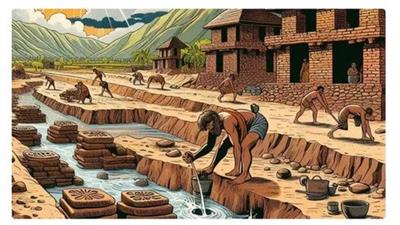Ancient Marvels: Uncovering The Secrets Of The Indus Valley
Ancient Marvels: Uncovering The Secrets Of The Indus Valley
![Ancient Marvels: Uncovering The Secrets Of The Indus Valley]()
What you'll learn
Explore the geographic and environmental factors that shaped Harappan society.
Learn about the well-organized cities like Harappa and Mohenjo-Daro.
Understand the economic, social, and religious practices of the Indus people.
Discover the unique art, trade networks, and technological achievements of this ancient culture.
Examine the theories surrounding the civilization's mysterious decline.
Requirements
Basic Interest in History No prior knowledge is required, but a curiosity about ancient civilizations and a passion for learning history will enhance your experience.
Description
The Indus Valley Civilization course offers an in-depth exploration of one of the world's earliest and most advanced urban cultures, flourishing around 2500 BCE in the fertile plains of the Indus River. This ancient civilization, which spanned parts of modern-day Pakistan and Western India, is known for its remarkable achievements in urban planning, architecture, and governance. Throughout this course, students will gain insight into the daily life, social structure, economy, and technological advancements of the Indus people, as well as their contributions to art, craftsmanship, and trade.We will begin by examining the geographic and environmental factors that shaped the civilization's development. The course then delves into the discovery of major cities like Harappa and Mohenjodaro, shedding light on the pioneering archaeological work led by figures such as Daya Ram Sahni and John Marshall in the 1920s. As we explore artifacts, inscriptions, and structural remains, students will uncover how the Indus Valley Civilization functioned as a sophisticated society and the role of its unique script, drainage systems, and standardized weights in daily life.In addition to exploring various theories surrounding its mysterious decline, the course will discuss the lasting impact of the Indus Valley Civilization on subsequent cultures. This course is ideal for students, history enthusiasts, and anyone interested in learning about the foundations of urban life in South Asia. Join us in rediscovering this ancient civilization and appreciating its contributions to human history.
Overview
Section 1: Introduction
Lecture 1 Introduction
Section 2: Background and Discovery
Lecture 2 Background and Discovery
Lecture 3 Geographical Extent
Lecture 4 Phases of Indus Valley Civilization
Lecture 5 Features of the Indus Valley Civilization Society
Lecture 6 Techno-Cultural Aspects of the Civilization
Lecture 7 Political Aspects of the Indus Valley Civilization
Lecture 8 Economic Aspects of the Civilization
Lecture 9 Trade and Foreign Links
Lecture 10 Religious Aspects of the Civilization
Lecture 11 Burial Practises of the Civilization
Lecture 12 Scientific & Technological Achievements
Lecture 13 Language and Script of the Indus Valley Civilization
Lecture 14 Town Planning in the Indus Valley Civilization
Lecture 15 Decline of the Indus Valley Civilization
Students and History Enthusiasts: Ideal for high school or college students who want to deepen their understanding of ancient civilizations, as well as history enthusiasts eager to learn about one of the earliest urban societies. 2. Educators and Teachers : A valuable resource for teachers seeking new ways to present the Indus Valley Civilization in their classrooms or looking for fresh insights to enhance their lessons. 3. Lifelong Learners: Perfect for anyone with a curiosity about human history, archaeology, and ancient cultures, regardless of age or academic background. 4. Competitive Exam Candidates: Beneficial for those preparing for competitive exams where ancient history is a part of the syllabus, as it provides a comprehensive overview of the Indus Valley Civilization. 5. Travelers and Cultural Explorers: Those planning to visit historical sites in South Asia will gain context and appreciation for the region's rich history, making the experience more meaningful. This course is crafted to engage and educate anyone who wishes to embark on a journey into the ancient world of the Indus Valley Civilization!
![Ancient Marvels: Uncovering The Secrets Of The Indus Valley]()
Say "Thank You"
rapidgator.net:
ddownload.com:

Published 11/2024
MP4 | Video: h264, 1920x1080 | Audio: AAC, 44.1 KHz
Language: English | Size: 449.89 MB | Duration: 1h 15m
Beneficial for those preparing for competitive exams-UPSC
MP4 | Video: h264, 1920x1080 | Audio: AAC, 44.1 KHz
Language: English | Size: 449.89 MB | Duration: 1h 15m
Beneficial for those preparing for competitive exams-UPSC
What you'll learn
Explore the geographic and environmental factors that shaped Harappan society.
Learn about the well-organized cities like Harappa and Mohenjo-Daro.
Understand the economic, social, and religious practices of the Indus people.
Discover the unique art, trade networks, and technological achievements of this ancient culture.
Examine the theories surrounding the civilization's mysterious decline.
Requirements
Basic Interest in History No prior knowledge is required, but a curiosity about ancient civilizations and a passion for learning history will enhance your experience.
Description
The Indus Valley Civilization course offers an in-depth exploration of one of the world's earliest and most advanced urban cultures, flourishing around 2500 BCE in the fertile plains of the Indus River. This ancient civilization, which spanned parts of modern-day Pakistan and Western India, is known for its remarkable achievements in urban planning, architecture, and governance. Throughout this course, students will gain insight into the daily life, social structure, economy, and technological advancements of the Indus people, as well as their contributions to art, craftsmanship, and trade.We will begin by examining the geographic and environmental factors that shaped the civilization's development. The course then delves into the discovery of major cities like Harappa and Mohenjodaro, shedding light on the pioneering archaeological work led by figures such as Daya Ram Sahni and John Marshall in the 1920s. As we explore artifacts, inscriptions, and structural remains, students will uncover how the Indus Valley Civilization functioned as a sophisticated society and the role of its unique script, drainage systems, and standardized weights in daily life.In addition to exploring various theories surrounding its mysterious decline, the course will discuss the lasting impact of the Indus Valley Civilization on subsequent cultures. This course is ideal for students, history enthusiasts, and anyone interested in learning about the foundations of urban life in South Asia. Join us in rediscovering this ancient civilization and appreciating its contributions to human history.
Overview
Section 1: Introduction
Lecture 1 Introduction
Section 2: Background and Discovery
Lecture 2 Background and Discovery
Lecture 3 Geographical Extent
Lecture 4 Phases of Indus Valley Civilization
Lecture 5 Features of the Indus Valley Civilization Society
Lecture 6 Techno-Cultural Aspects of the Civilization
Lecture 7 Political Aspects of the Indus Valley Civilization
Lecture 8 Economic Aspects of the Civilization
Lecture 9 Trade and Foreign Links
Lecture 10 Religious Aspects of the Civilization
Lecture 11 Burial Practises of the Civilization
Lecture 12 Scientific & Technological Achievements
Lecture 13 Language and Script of the Indus Valley Civilization
Lecture 14 Town Planning in the Indus Valley Civilization
Lecture 15 Decline of the Indus Valley Civilization
Students and History Enthusiasts: Ideal for high school or college students who want to deepen their understanding of ancient civilizations, as well as history enthusiasts eager to learn about one of the earliest urban societies. 2. Educators and Teachers : A valuable resource for teachers seeking new ways to present the Indus Valley Civilization in their classrooms or looking for fresh insights to enhance their lessons. 3. Lifelong Learners: Perfect for anyone with a curiosity about human history, archaeology, and ancient cultures, regardless of age or academic background. 4. Competitive Exam Candidates: Beneficial for those preparing for competitive exams where ancient history is a part of the syllabus, as it provides a comprehensive overview of the Indus Valley Civilization. 5. Travelers and Cultural Explorers: Those planning to visit historical sites in South Asia will gain context and appreciation for the region's rich history, making the experience more meaningful. This course is crafted to engage and educate anyone who wishes to embark on a journey into the ancient world of the Indus Valley Civilization!
Screenshots

Say "Thank You"
rapidgator.net:
ddownload.com: